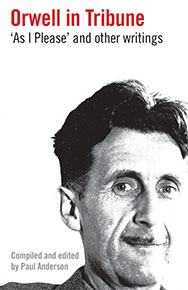Description
The new Aaaargh! Press edition of Orwell in Tribune, a collection of George Orwell’s columns for the left-wing weekly Tribune in the 1940s introduced and edited by Paul Anderson, will be available in early 2021. The first edition was published to widespread acclaim by Methuen in 2006.
WHAT THEY SAY
This revelatory collection shows how the different sides of Orwell’s imagination interacted… The fascination here is reading Orwell as a working journalist on a single paper. He attended editorial conferences with Nye Bevan (someone should write a play about the encounter), commissioned reviews and made a doomed attempt to publish short stories by organising a competition… Week by week, column by column, his inspirations take shape… His swipes against propaganda, the manipulation of crowds, the squalor of wartime and postwar London life, the absurdities of bureaucracy and the growth of the Great Powers formed the raw material of Nineteen Eighty-Four.
SEAN FRENCH Independent
This collection is remarkable, not because it contains any of Orwell’s greater or more famous essays, but because, 60 years on, his articles are still wonderfully readable… Even when Orwell is using the column to settle one of his many scores with some foe now otherwise totally forgotten, Anderson’s thorough footnotes will tell you all you need to know to appreciate Orwell’s invective.
MARTIN ROWSON Tribune
Anderson’s informative introduction includes a long digression into the left-wing politics of the period, which some may find heavy going but which supplies the wider context. The footnotes constitute a veritable Who Was Who of British politics and literature in the first half of the last century. Who was Barbara Castle’s husband and who her lover? Who were Vernon Bartlett, the Duchess of Atholl, Leonard Merrick? Answers sit conveniently at the foot of the page.
GORDON BOWKER Observer
Anderson’s compilation usefully picks out (and edits superbly) a particular thread in Orwell’s huge output. Unlike his broadcast commentaries to India, ‘As I Please’ was not concerned with day-to-day events but with broader political thinking: half-inside, half-outside the whale. Warning against the political control of discourse, blanket praise for the Soviet Union and anti-German hysteria, Orwell worked out in plain language the great themes of Animal Farm and Nineteen Eighty-Four. If he abandoned his early hopes that the war would effect a socialist revolution, he never doubted that people would act properly if they only understood.
KATE MCLOUGHLIN Times Literary Supplement
Orwell in Tribune: ‘As I Please’ and Other Writings, 1943-47 (Politico’s £19.99). It is compiled and edited by Paul Anderson, a former Tribune editor whose special insights into Orwell’s genius make this particular volume the very best on the subject.
MICHAEL FOOT Observer
It is a tribute to the publishers and to Tribune itself that Paul Anderson has been able to edit such a superb compendium of Orwell’s writings at a crucial stage in his life.
GEOFFREY GOODMAN Camden New Journal
The book gathers together all the pieces Orwell wrote for Tribune… Published as a whole, and in sequence, you can see what Anthony Burgess meant when he wrote of him: “Everything Orwell said had such a stamp of honest sincerity…” As Anderson also points out in his introduction, the collection shows off “one of the greatest practitioners … of the craft of turning out 800-2,000 words a week”. He was Tribune‘s William Hazlitt, and Orwell in Tribune does much more than re-affirm that fact as well as his genius.
DUNCAN HAMILTON Yorkshire Post
Neatly edited by Paul Anderson, and good on the contemporary left-wing background, this deserves to sit on the same shelf as Peter Davison’s monumental George Orwell: The Complete Works.
D J TAYLOR Sunday Times
This book is a collection of all the columns [Orwell] produced between 1943 and 1947… It comes with a lucid and thoughtful account of Tribune and Orwell by former Tribune editor Paul Anderson. It … shows Orwell to have been the best sort of newspaper columnist.
FRANCIS BECKETT Guardian
Even if I had read the pieces before, I profited by reading them again in this attractively presented and well edited collection… Paul Anderson’s notes are not only copious but informative, the work of someone who knows the subject and the period…
GEOFFREY WHEATCROFT Spectator
To read the Tribune articles in sequence, and see him taking up points from previous columns, arguing with correspondents and expanding on dozens of subjects is to raise him from the dead, as it were, and have him talking in your living room or – as Orwell would prefer – your local. The easy explanation for the success of Paul Anderson’s intelligently edited and beautifully presented collection is that Orwell was a great writer… Yet Orwell’s talent flourished in a particular setting, that of a small journal with a tight group of readers… Tribune was a magazine of the Labour left that for a few years in the forties broke the arguments that were to dominate British political life.
NICK COHEN Democratiya
Evidently Orwell was well equipped, in 1943, to take on the literary editorship of Tribune. He could write interestingly about pretty much anything, and had often appeared in its pages already… The relevant history of the journal is sketched with authority by Paul Anderson in his introduction to this book.
FRANK KERMODE New York Review of Books


